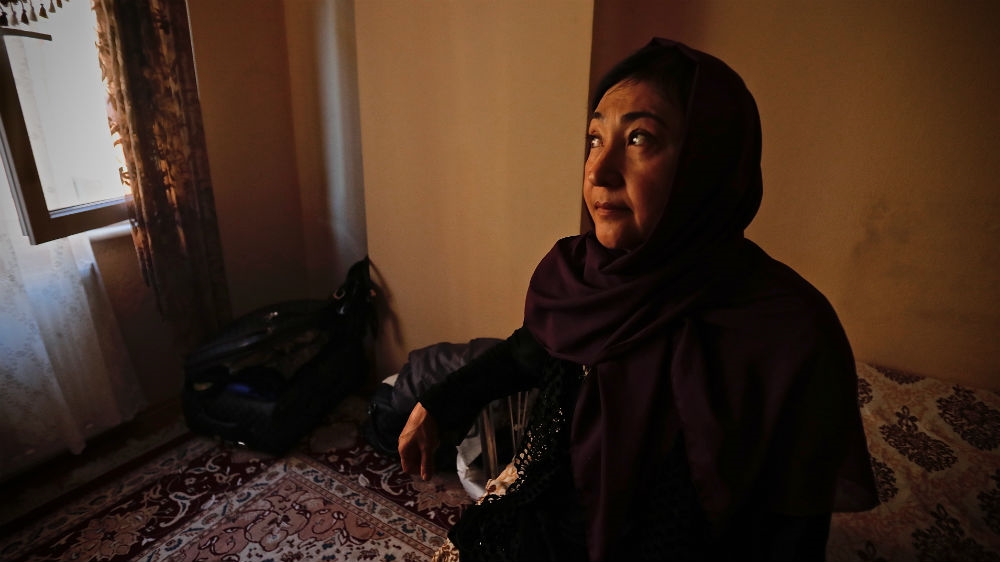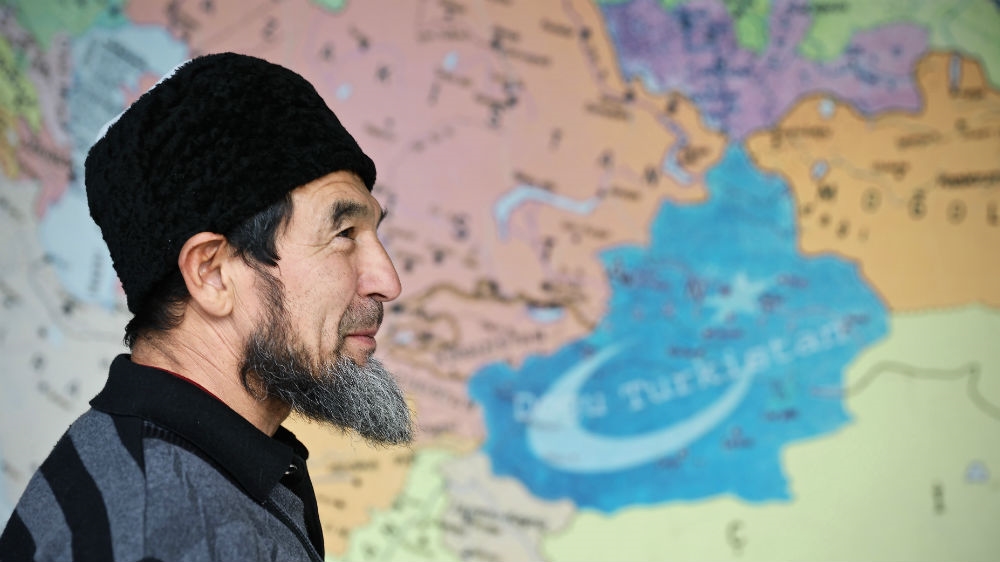Exposed: China’s surveillance of Muslim Uighurs
Zonguldak, Turkey – The Turkish coal-mining town of Zonguldak seems an unlikely place to meet a man who says he’s a Chinese spy, but it’s here where Yusuf Amat arranged to meet us.
Sitting in the lobby of a hotel overlooking the Black Sea, waiting for him to arrive, I wonder what kind of person would agree to inform on neighbours, friends and even family for a government accused by rights groups of carrying out a brutal campaign of mass arrests and detention.
As Amat walks in through the glass door, I almost miss him. Wearing grey overalls, a grey cotton-knit hat and a grey bulky jacket, everything about him – from his clothes to his mannerisms – is unremarkable.
“Ni hao (hello),” Amat says softly, greeting me in Mandarin as he casts his eyes down and gently shakes my hand.
“Sorry for being late, I just finished my shift at the gas station and had to take a few buses to get here.”
 |
| Uighur Yusuf Amat says the Chinese government allegedly forced him into spying on his family and friends in Xinjiang and abroad [Jenni Henderson/Al Jazeera] |
Amat is Uighur. A Muslim ethnic-minority group in China, Uighurs have been the target of a major crackdown by the government in Beijing. A United Nations human rights panel says this has led to up to a million people being imprisoned, in what the Chinese call “reeducation centres“.
“My role,” Amat explains,”was to feed information to officials”.
“I reported on everything people did – what they ate, drank, what they did in private in their homes, whether it was friends or relatives, I shared it all.”
Amat says his information was sent to authorities.
What upsets Amat, he says, is that the officials often imprisoned people for “harmless and inconsequential” reasons.
“You could have a long beard or some religious text on your phone, or maybe you studied abroad or had a long-distance phone call with someone overseas. It could all land you in detention.”
Amat says he began spying in 2012 because officials arrested and tortured his mother, threatening to keep her in detention unless he agreed to work for them.
“From when I was young, I always told myself I would protect my mum. But I didn’t do it. When they took me to see her, my heart was so pained.”
China’s expanding global network of surveillance. From 2012 to 2018, Amat says he was told to infiltrate Uighur communities in Afghanistan, Pakistan and Turkey. He says Beijing has “countless” informants around the world.
“I’m from the small town of Karamay and I’m just one of many my handler deals with. There are dozens of towns the same size throughout Xinjiang, not to mention big cities. And then there are the international operations. So you can imagine how many eyes are out there.”
And Amat says China is getting bolder on the international front, claiming government operatives have abducted Uighurs abroad.
Once back in China, he says, many disappear into the reeducation centres.
China’s government denies Uighurs are being arrested arbitrarily and held against their will and says these are “voluntary” vocational training facilities, designed to provide job training and to stamp out “extremist” tendencies.
Amat says the government is “outright lying” and he himself spent a year and a half in a detention centre, having been arrested for trying to fly to the Middle East and join Muslim fighters.
It was while he was serving his sentence that he says authorities recruited him. Once he agreed to be an informant, Amat says he was given the job of cleaning the detention facilities.
His rounds gave him access to many areas of the centre.
“I’ve seen many people being beaten in interrogations inside. At times they used bare electrical cords – which inflict pain beyond what you can imagine. Those who were beaten made horrible shrieks, especially the young ladies my age. What I can’t forget is the blood – human blood on the floor, on the walls, everywhere, afterwards.”
Al Jazeera spoke to more than a dozen former detainees. Many confirm they either witnessed or were themselves tortured and abused in these centres.
 |
| Uighur-Muslim scholar Abduweli Ayup volunteers his time to teach the Uighur language and culture to children who have fled Xinjiang with their families [Steve Chao/Al Jazeera] |
Abduweli Ayup, a teacher and writer, spent 15 months in three facilities in Urumqi, the capital of Xinjiang province. On the day of his arrest, he says police officers allegedly took him to a holding cell and raped him.
“The first day was very bad,” says Ayup.
“They stripped me of my clothes, slapped my buttocks and then they abused me … more than 20 Chinese guys. The next day, police asked me, ‘One day, if you guys are in power, what will you do to us?’ I said, ‘Look, I’m a human being, I’m not an animal like you’.”
Ayup says in the months that followed, he was regularly beaten by other inmates. Prison guards ignored his calls for help, he adds.
“They want you to be tortured like this. If you’re tortured a lot, it’s easier for you to cooperate with them during the interrogation.”
Ayup says the rape and beatings were orchestrated to get him to admit to being a separatist or a “terrorist”.
“I am a teacher, I am a scholar. I have never thought about these things. I am not a separatist. I am not a terrorist. What do I have to confess?” he asks.
Ayup was jailed for raising money for Uighur schools after Chinese authorities made it illegal for children to learn the Uighur language.
“They want to delete Uighur. They want Uighurs to believe the Chinese Communist Party is God,” Ayup says.
After being released, Ayup says he feared he would be locked up again, so he fled with his family to Turkey. Uighurs share a long history with the country and thousands have settled there in the last decade.
In Istanbul, Ayup has been documenting the stories of Uighur detainees.
One of those is Gulbakhar Jaliloua.
Ayup takes us to meet her at a safe house in the city. Sitting on a couch, she begins to sob uncontrollably as she recounts her experience.
“I was held for one year, three months, 10 days … I counted every single hour and minute. An hour felt like a year,” she says.
Jaliloua says she was arrested in Xinjiang while picking up a shipment for her clothing business. What baffles her about the arrest is that she isn’t even a Chinese citizen. When she told authorities she was from Kazakhstan, they simply hid her identity, Jaliloua says.
“They gave me a Chinese name and Chinese ID number so the Kazakhstan embassy couldn’t find me.”
Jaliloua recounts how she was crammed into a small cell with up to 35 other women, and then subjected to terrifying interrogations that sometimes lasted 24 hours.
“They put a black hood on my head, and handcuffs and chains … I couldn’t walk fast with the leg cuffs, so they kept pushing me. When I fell down, they dragged me to the interrogation room.”
 |
| Gulbakar Jaliloua is a Muslim Uighur and citizen of Kazakhstan. She says she was detained for more than a year by the Chinese authorities when she made a business trip to China. [Steve Chao/Al Jazeera] |
Jaliloua says she and other Muslim inmates were not allowed to pray and they lived in constant fear they would be punished if found to be secretly doing so.
In detention, she lost 30kg but says her treatment was better than that meted out to Chinese Uighurs.
“There was this young woman named Patigul … One day, she came back with her hair all messed up … She showed me the right side of her head. It was swollen and bleeding … after a heavy beating.”
Chinese officials categorically deny accusations of abuse and ignore growing international calls to shut down the “reeducation” centres.
The government says it will allow UN officials to visit the facilities, so long as they “abide by Chinese law … avoid interfering in domestic matters … and instead, take on a neutral and objective attitude”.
Amat says it is no longer possible for him to stay silent on the treatment of his people.
“China thinks what they’re doing is right, but they’re wrong,” he says. “Yes, every country has their own laws, but there is also a universal international standard. And in my eyes, they’re seriously violating this standard. Uighurs don’t have a right to our own freedom, to live the way we would like.”
 |
| A Uighur man stands in front of a map showing Xinjiang, the Uighur homeland in China that some believe should be the independent state of East Turkestan [Steve Chao/Al Jazeera] |
Amat confesses he’s been consumed with guilt for informing on fellow Uighurs.
“It’s like a painful needing stabbing into me every time.”
I asked him why he’s decided to share this information now. Amat says he longer has much to lose. Most of his family have been placed in centres, in part, he says, because of his spying.
“My sister, my mother and my brother-in-law, his brothers, their parents, my uncle … they’re all in jail. They’re all in there.”
Amat says he moved to Zonguldak because few Uighurs live in the town, making it harder for Chinese officials to ask him to spy.
Now that he’s spoken to media, he says it’s likely he’ll face retribution.
But he says he’s ready.
“This is not just about my immediate family, this is about taking a stand for every Uighur. They’re all my family. My own life doesn’t matter. Whatever happens, happens. I’ve lived enough.”
101 East follows the Uighurs’ quest for a safe place to call home. Find more here and join the conversation @AJ101East




